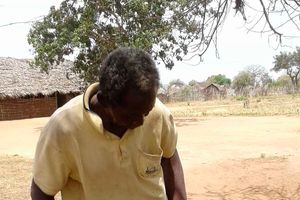
In Kenya, elephantiasis is endemic in several regions, particularly in coastal areas and parts of the Rift Valley.
Elephantiasis, also known as lymphatic filariasis (LF), is a neglected tropical disease caused by parasitic roundworms. These worms live in the lymphatic system of humans, where they block lymphatic channels and lead to the accumulation of lymph fluid. This results in painful swelling and thickening of the skin, which commonly affects the legs, arms, and genital area.
According to Nelly Bosire, a medical expert and Nation.Africa columnist, adult worms can live for up to six years once they enter the lymphatic system. They reproduce and their larvae are spread by mosquitoes, thus continuing the cycle.
Once established, the worms cannot be eradicated by medication; they must run their course. However, preventive treatments exist to curb transmission.

A roundworm nematode, one of the causative agents of lymphatic filariasis (elephantiasis).
How to avoid elephantiasis:
Protect yourself against mosquito bites, as elephantiasis is spread by mosquitoes such as the Culex, Anopheles and Aedes species. Also, keep your surroundings clean to discourage mosquito breeding.
Finally, participate in Mass Drug Administration (MDA). The World Health Organization (WHO) recommends preventive chemotherapy in endemic regions. Taking annual doses of antifilarial medicines such as albendazole and diethylcarbamazine reduces the risk of contracting the disease.
Is elephantiasis hereditary?
No. Elephantiasis is not passed on from parents to children through genes; it is caused by parasitic roundworms that are transmitted only through the bite of infected mosquitoes. However, in families or communities where many people are infected, it may appear hereditary because multiple relatives may become infected due to shared exposure to infected mosquitoes in the same environment.
Can it be spread through human-to-human contact?
No, elephantiasis is not contagious and cannot be spread by touching, hugging, sharing food or being near someone who has it. The only way to contract the disease is by being bitten by infected mosquitoes that carry the larval stage of the parasite. Once inside the body, the parasite targets the lymphatic system, where it matures and causes blockages over time.

Elephantiasis, also known as lymphatic filariasis (LF), is a neglected tropical disease caused by parasitic roundworms.
The Kenyan context
In Kenya, elephantiasis is endemic in several regions, particularly in coastal areas and parts of the Rift Valley. It predominantly affects rural communities with limited access to healthcare, sanitation and clean water. It often leads to social stigma, economic hardship and a diminished quality of life for those affected. In recognition of the urgent need to address elephantiasis, Kenya's Ministry of Health launched the National Programme to Eliminate Lymphatic Filariasis in 2002. The programme's primary strategy is mass drug administration, which involves distributing medication to entire populations in endemic areas to interrupt the transmission cycle.
In 2018, the Ministry introduced a new triple-drug therapy known as IDA (ivermectin, diethylcarbamazine and albendazole). This regimen has shown promising results in reducing lymphatic filariasis transmission more rapidly than previous treatments. Kenya became the first country in Africa to pilot this approach in Lamu and Mombasa counties.
Seven years ago, the Ministry of Health launched a national initiative to eliminate elephantiasis, focusing particularly on regions where the disease is prevalent. While the programme has made strides in some areas, communities like Gesere still await its full impact.
Key takeaway:
Elephantiasis is an infectious disease, but not a contagious one. Preventing it involves mosquito control, mass drug administration and education, rather than isolating patients. People living with elephantiasis deserve support and compassion, not stigma.




